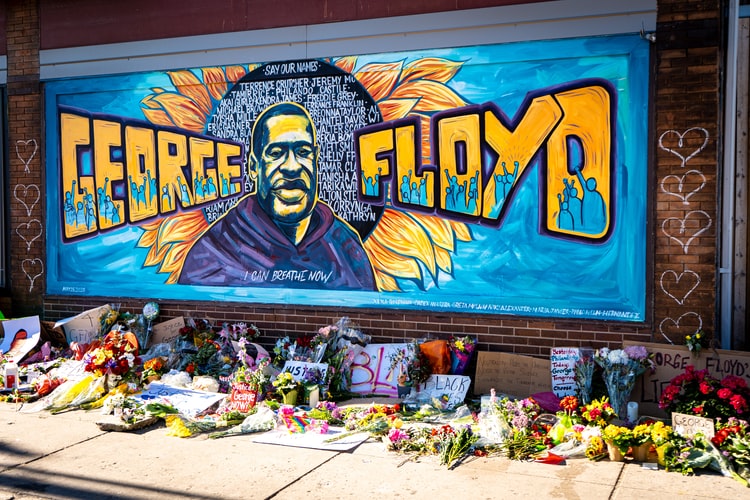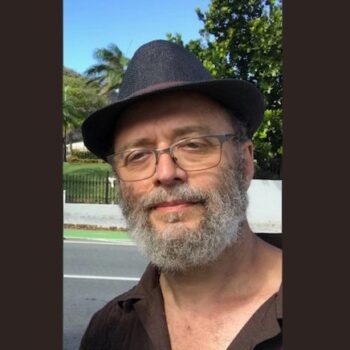The uprisings in Minneapolis over the murder of George Floyd sparked a worldwide protest movement with a unifying demand: Defund the police. Once a radical idea, the notion of moving public funds away from policing and into social services has increasingly come to seem like common sense. Perhaps nowhere has the movement to defund the police seen more success than in the city where the uprisings began: Minneapolis. Within a week of the uprisings, the city’s school system cut ties with the Minneapolis Police Department (MPD); within two weeks, a veto-proof majority of the City Council voted to dismantle the MPD.
One of the reasons for the movement’s success in Minneapolis is the organizing work of groups like Reclaim the Block, Black Visions Collective, and MPD150, which have been pushing for the abolition of the police department for a number of years. The Forge sat down with Arianna Nason and Ricardo Levins Morales, two organizers from MPD150, to talk about their organizing work, the current uprisings, and the importance of planting narrative seeds to shift our collective sense of what is possible.
This interview has been edited and condensed.
Tell me about MPD150 and the work that you do.
AN: MPD150 is an abolitionist collective of artists, organizers, elders, youth, nerds, anyone under the sun that wants to be involved in this work. And we are shifting the narrative towards a police-free future.
How did you each get involved?
RLM: [The group] came out of a conversation I was having with another of our core group members … in my studio. I was just staring blankly at one of my posters, which had grown out of the protests in North Minneapolis over the police killing of Jamar Clark. And [there was] an image of police, with the slogan: Minnea-police, protecting wealth and whiteness since 1867. This was in the spring of 2016. We just realized, wait a minute, next year, it’s going to be the 150th anniversary of the Minneapolis Police Department. Maybe it’s time for a performance review. That’s where the seed was born. And we just started reaching out to organizers. Not to organizations but individuals throughout the organizing ecosystem, saying, “What if we were to take this moment to produce a performance review [on] the anniversary of the police department and demonstrate that they’re not reformable and that they’re actually fulfilling their mission. And we need something else.”
The movement against police brutality started out as a truth-telling moment. Each protest, it’s like, “Oh. This is the truth of what’s happening.” And that can be really liberating the first time, the second time, maybe the fifth time, but after a while, it becomes re-traumatizing. It’s actually, if the only menu people have to grab in those moments [are] reforms that everyone deep in their heart knows [are] not going to mean anything, it just starts becoming demoralizing. And you can run on anger only so long. So we were really talking about what would hope-based organizing look like? What if we could change the narrative enough so that the next time there was a crisis like this, people could reach for something on the menu that really would matter?
What is the narrative that you’ve been telling?
AN: It’s the narrative that we’ve known deep in our bones, deep in our bodies. Stories from our elders, from our ancestors, that there was a time before police and there will be a time after. And looking at all of the ways that we have experienced, collectively and independently, trauma at the hands of this violent institution. And then really re-envisioning a way to move beyond it.
RLM: Capitalism, like any oppressive system, functions by making us live our lives in a way that benefits them. That means preventing us from being who we really are. It stems through a lot of mechanisms and the police is a very important one of those. Increasingly, resources are shifted from communities into the police, and we in the community feel like we’re dependent on them. It’s like, who are you going to call, not only in violent situations, but for certain kinds of social services? And it’s thus becom[e] this feeling that the police are necessary. That part of this narrative work, really, is to break that narrative. By looking at the past, where do they come from? Looking at the present, how we’re relating to [the police department] now, and how’s that working out for you? And then looking at the future in terms of what needs to be done that isn’t being done that could create that alternative. And that is how we structured our report: past, present and future.
What was the response to the report?
AN: It was really well received by the community, at least from what I can tell. The only real pushback was just skepticism. And here we are. But at our launch for the report, we were completely at capacity. And then we had an absurd number of independent viewers on a livestream that Unicorn Riot was doing. So, it was clear to us in that moment that what we’re doing is wanted, it’s necessary, it’s lifegiving, it’s sustainable work.
RLM: We had started out under the radar. Trying to not to advertise ourselves, working in task forces, people going out and doing interviews. But even before the report was launched, it was already starting to make ripples or waves. A number of groups put out the questionnaire to the candidates, people running for City Council and Mayor. One of the questions was: Can you envision a future without the police in Minneapolis? And when a significant number of candidates said, “Yes. I can,” the Downtown Council, which is a business association, and the head of the City Council called a press conference to say what a terrible idea this was. Like, “Over here. Don’t pay any attention to this. This is a really bad idea. This over here, don’t notice it.” It was such a gift.
Narrative organizing is about planting the seeds of the tree we want to ultimately live under, and we all know that trees take a while and sometimes you have to wait for the rains to come. We expected that we would be working the soil, doing the things we did — exhibit, audiobook, concerts, speaking to classes — for years to slowly get people accustomed. We didn’t expect that [positive response] from the moment of the launch. We’re just so ready to hear a different story. The police narrative has been so powerful because they get questioned on their policies, they get questioned on their past practices, they get challenged on how they treat people, but the legitimacy [of the police] has never been robustly challenged before.
Are you surprised by how fast the conversation has shifted around the legitimacy of the police?
RLM: Not in the slightest.
AN: No. I’m not surprised. I’m in happy shock. I have always really deeply known that there was going to be a thing. There was going to be a catalytic moment where the entire world would have to radically shift in response, and to really, truly evaluate how we are living. And here we are.
RLM: I would have to answer that question by saying yes and no. Certainly I didn’t expect that this moment would come this early in the work we were doing. One of the ways to look at a crisis for an organizer, it’s a report card of how we’ve been doing in between. And during the periods of low movement activity, that’s a report card of how we made use of the crisis. So, having been in this work since I was a teenager, I have internalized the idea that things happen in cycles and ebbs and flows. And even very similar to earthquakes, that we don’t know when the pressure along a fault is going to become an earthquake, but if we understand continental shift, we know it’s going to happen. And how do we prepare for that? So, the work we’ve been doing is preparing for that. I know that the struggle is not linear. You can seem to just be treading water for so long and then all of a sudden, [everything changes]. And this is one of those moments.
In a way, it’s like we were planting our little dandelions to support this kind of work. And this flashpoint happened in Minneapolis, which is one of the cities where that planting around the idea of abolition has been the most advanced, [though] by no means the only place. [As a result], this crisis has not seen people in the Twin Cities reaching for those same tepid reforms. We walk this tight rope that we don’t want to be grandiose about what we have accomplished, but at the same time, it’s really important to think about how important it is to normalize ideas that people think are crazy. Unlike the nonprofit strategy of saying, “Well, what is winnable right now?” Part of a narrative strategy is to say, “What is not winnable and how do we change that?”
We’re trying to put wind in everybody’s sails. So that, as the work developed, when there’d be a police killing, we weren’t out there holding a press conference, putting out statements, wanting to have our space at the mic, that’s for other people to do. We’re creating the backing that they need in order to be more effective. Even the reformist groups have more wind in their sails when there are crazy radicals like us pushing militant narrative. When we held our own events, when we held our exhibit or created panels to talk about it, those panels were filled with leaders from the communities, not our own members. So, we’ve been able to create a more movement-wide sense of where we fit, rather than one more organization jockeying for attention.
What have you seen as the role of MPD150 during the uprisings?
AN: Giving space for folks to believe that what we are saying, what Black Visions Collective, what Reclaim the Block are saying, what they are calling for, is not only possible, but it’s necessary. And to be a way to resource a lot of that information out. And we have, on the resources page at MPD150.com, a ready document of updated information on all things abolition on all the things that are coming out of the Minneapolis uprising.
RLM: We retain our nature as a narrative organization, and this, of course, is a narrative moment. When people are saying, “What do you mean a future without police? How could that possibly work?” On tens of thousands of occasions in the last two weeks, people’s response [has been], “Oh, check out MPD150.com.”
AN: Our website keeps crashing.
RLM: We work very closely with Reclaim the Block, which is an organization that has taken this concept and moved it into the policy arena. A couple of years ago, they forced $1.2 million out of the police budget into community-based resilience settings that the coalition itself demanded and specified — and forced the City Council to do that. The same City Council now has declared they want to abolish the police. But that was not something that came naturally. That came out of relentless organizing. And the Black Visions Collective, which is also one of our closely-tied sister organizations, we’re among the three that have really been very clear about abolition being the drum beat.
Our role [during the uprisings] has become very much, “Here are some of the answers you’ve been searching for.” We’re creating new materials. We have a comic book coming out that’s on the myth of community policing. We have an expanded version of our report, which includes an oral history of how this organizing [took] place. So, we continue to put that kind of information out.
We spent the first year [of our existence] preparing and creating the report. We spent the second year doing an exhibit and audio books and classes and teachings. And we were prepared to spend the third year producing those materials, where there were still gaps, and training other organizations, and then sunset out of existence. We had a specific role to play. We weren’t a permanent organization necessarily. And according to that timeline, we would have closed out some months ago. But history had another idea in store for us. So what we’ve been preparing for, which is the narrative shift, that earthquake, the tectonic plate moment, has come on a schedule that we couldn’t have predicted.
What role do you see your collective playing as the City Council starts the work of talking about how they’re going to dismantle the police?
AN: We are already seeing a few of the City Council members rolling back on their statements. I’m going to choose to believe in the process and in the ability to shift the narrative over time. And also recognizing that, yes, our City Council members have a job and a role to play and they are still human, they are a part of our community. They’re also rapidly learning how to adapt to this change. And it’s scary and it’s hard and it’s going to take a lot of work and it’s going to take time. And so, at least for us, what I really see continuing to happen, is to make sure that the language is out there, that the narrative is out there. To really clearly illustrate: This is possible, this is necessary, and it’s going to happen now.
RLM: [Our job has been] to flip the script so that abolition stopped being seen like this utopian naive thing. To say, “No, actually, it’s the continuation of policing that’s magical thinking, [the idea] that it [could] become anything other than the toxic brutal animal that it is [is magical thinking] because that’s what it was created to be.” Once you know that, it frees the imagination to think, what else? Because, the mind can’t go back to say, “Well, at least we can stay here if we can’t think of anything better.” It’s like, “No. You can’t stay here.” So, we have to start thinking of alternatives.
And also, how can we create enough stability and resilience in the struggle? So, that if we face major setbacks, the narrative rhythm that we’ve created, doesn’t get [set back]. Here in Minnesota, we understand what it’s like to push a car out of a snowbank. It doesn’t go on the first push. It’s a lot of rocking, and each one gets you closer. But also, it takes everybody pushing at once, and then with each other. So that’s the work. Who knows what’s going to happen right now. But even if we get sold out at this moment — and the backlash will be ferocious — the idea is that we are looking at, well, what is needed? What do people need to know, to think, to be prepared for, to be inoculated against? So that these events, just like the uprising we’re in, won’t come as a shock to the system.
Is there anything else you want to add?
AN: We are getting a lot of asks for training. For information on, “How did you do this? How are you doing this? How are you going to keep doing this?” And we are still discussing in-house, what next steps we want to take. But I know there is interest amongst members, amongst myself and another member of the team, of starting a seed planter training institute of some kind [so that] we can tangibly share the ways that we were able to do this.
RLM: One of the important things I would love to get people to pull out of our experience is that story of planting seeds. [We have an] environment in which organizers think about, “Well, what can we win?” “And how do you identify the decision maker in this particular issue?” “What is their stake in giving us what we want?” In other words, “What can we expect out of them in exchange for restoring stability to them?” And we’re not about restoring stability. We’re about destabilizing as a first step toward destabilizing even more. It requires really coming up with a visionary narrative.
Meeting people where they’re at means meeting them where they’re at, listening to them and listening much deeper to what they hunger for. And create a narrative around that, because that’s what moves us forward. Sometimes it’s a slower start [but] it leads to people really lighting on fire more than when you organize around weaker demands. And ultimately, it’ll get you where you really want to be, not just into a world where we’re harmed 30% less.


